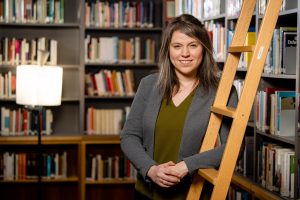A borderland in transition: Building scholarly ties with Ukraine
Thanks to a donation by the Temerty Foundation in Toronto, Myriad Canada has been able to finance a four-year scientific research project, the “Ukraine in European dialogue project” with the Institut für die Wissenschaften vom Menschen (IWM) in Vienna, Austria.
The project raises the quality of scholarship and intellectual discussion around Ukraine, bringing it into the broader European narrative. “There is absolutely no way to tell the story of Europe without including Ukraine in it,” says research director Katherine Younger.

Katherina Younger,
research director IWM
A platform for intellectual exchange
The IWM is an independent institute for advanced study in the humanities and social sciences founded in the final days of the Cold War. The institute has a long-standing tradition of solidarity and exchange with Eastern European societies in transition. Since 2015 rector Shalini Randeria has brought a more global focus to the institute. “Ukraine kind of bridges this gap, it continues this tradition of solidarity with Eastern Europe, but it also is a bigger story that fits into themes that are relevant to the history of the world more broadly,” says Younger.
The scientific project was conceived in 2015 in the wake of the Maidan revolution. “What we recognised at that time is that Ukraine is a sort of proving ground for things that are going to become major preoccupations of the world more broadly,” says Younger. “Hybrid warfare, information propaganda, fake news, all of these sorts of themes have really been dealt with by Ukrainians longer than they were at the forefront of our consciousness elsewhere in the world.”
The partnership with Myriad Canada in mid-2019 gave the project the programme support it needed. “Myriad Canada has been the ideal partner for us, because everything is perfectly arranged to handle situations exactly like ours where we’re working in multiple international contexts,” says Younger.
Learning from each other
Through fellowships, the project helps Ukrainian intellectuals build new networks crucial for the success of reform efforts and for building a sovereign state governed by the rule of law. Fellows represent a wide range of disciplines, including historians, political scientists and anthropologists. At IWM they get the opportunity to meet with their counterparts and leading scholars in their fields from all over Europe, finding new ways to frame Ukrainian realities within the broader global context.
At the same time, European scholars are able come into contact with question of Ukraine and with Ukrainian academics, often for the first time. “From the European side, one of the things we have recognised is how much more complicated the Ukrainian story is than what we’re often seeing in the media,” says Younger. Scholars from Europe and North America gain insight into dynamics in Ukraine relevant to the European present and future. “We have as much to learn from Ukrainians as they do from all of us,” says Younger. “There is a new generation and a new initiative to make changes within Ukrainian politics and society and scholars come away very energised by that. A lot of them tell me it gives them hope for Europe more broadly.”
Innovative events
In December 2019 the IWM hosted the highly successful closing conference of the bilateral cultural year of Austria-Ukraine, examining the modern history of the region between Vienna and Kiev. “There are multi-directional movements of people, ideas, objects,” Younger explains. “It’s this complicated exchange that both sides benefit from.”
The innovative and historical conference brought together scholars from all over Europe and attracted a wide audience with its public programme. The dialogue project is following up on new insights gained through the conference while preparing for another large conference in 2021. In the meantime, the IWM will continue to organise smaller events, discussions and seminars featuring fellows and open to the public. Recently they have also shifted to more online event formats in the wake of the COVID-19 pandemic.
More than power politics
Through its research, publications and events, the project allows a deeper scientific look into a country with a complex history and unique society that go far beyond the current power struggle between Western Europe and Russia. “I think the crucial question here is maintaining agency for Ukraine and for Ukrainians in all of these discussions,” says Younger. “We are trying to remind people that Ukraine is a real place that it has its own concerns that go beyond just broad questions of geopolitics.”
Younger herself has been devoted to the study of Ukraine since she visited the country for the first time when she was fifteen years old. Immediately captivated by the confluence of the Habsburg and Russian empires, Catholicism and Orthodoxy, she went on to do a PhD in history. Explaining why she found Ukraine so enthralling, she says, “I was fascinated by it as a sort of in-between zone, as a sort of borderland, as a place where a ton of different currents collide and come together, and the way that the local population works through these and tries to mould them to their own realities.”

